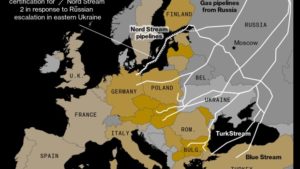No, the energy crisis is not some unforeseeable consequence of the Ukrainian war. It is the result of years of wishful thinking, preening and short-termism. We sit on 300 years’ supply of coal. We have rich pockets of gas trapped in rocks beneath Central Scotland, Yorkshire, Lancashire and Sussex. We have as good a claim as any country to have invented civil nuclear power. Yet, incredibly, we face blackouts and energy rationing.
The calamity into which we are heading this winter represents a failure of policy under successive governments going back decades. The fact that much of Europe is in the same boat – and that poor Germany is barely in the boat at all, but is clinging by its fingertips to the gunwales – is no consolation.
Like their counterparts in other Western countries, our leaders are now scrambling to make up for past errors. More nuclear power-stations are mooted. The ban on shale gas extraction is reviewed. Sudden attention is paid to potential new sources of clean fuel, from hydrogen to fusion. All good stuff. All too late.
You can’t build a nuclear power plant in less than five years. Even fracking takes around ten months to come online – and that assumes that you have first cleared all the planning hurdles. Hydrogen has vast potential, and what Britain is doing with fusion, not least at the Atomic Energy Authority’s facility in Culham, is mind-blowing. We may well be less than two decades away from solving all our energy problems. But none of that will see us through next winter, when average household fuel bills are set to rise to over £4000.
How did we allow ourselves to become so vulnerable? It was hardly as if disruption in global energy markets was unthinkable. Most of the world’s hydrocarbons are buried under countries with nasty governments. For every Alberta, there are a dozen Irans; for every Norway, a dozen Nigerias. There is even a theory, first advanced by Juan Pablo Pérez Alfonzo, the Venezuelan energy minister who founded OPEC, that the very fact of having oil turns a country into a dysfunctional dictatorship.
We have seen wars, blockades and revolutions across petro-dollar economies. We knew that a break in supply was always a possibility. And it was hardly as if Vladimir Putin was disguising the nature of his regime, for heaven’s sake.
No, we are in this mess because, for most of the twenty-first century, we have ignored economic reality in pursuit of theatrical decarbonisation. Actually, no, that understates our foolishness. Decarbonisation will happen eventually, as alternative energy sources become cheaper than fossil fuels. It is proper for governments to seek to speed that process up. But this goes well beyond emitting less CO2. Our intellectual and cultural leaders – TV producers, novelists, bishops, the lot – see fuel consumption itself as a problem. What they want is not green growth, but less growth.
…
…


